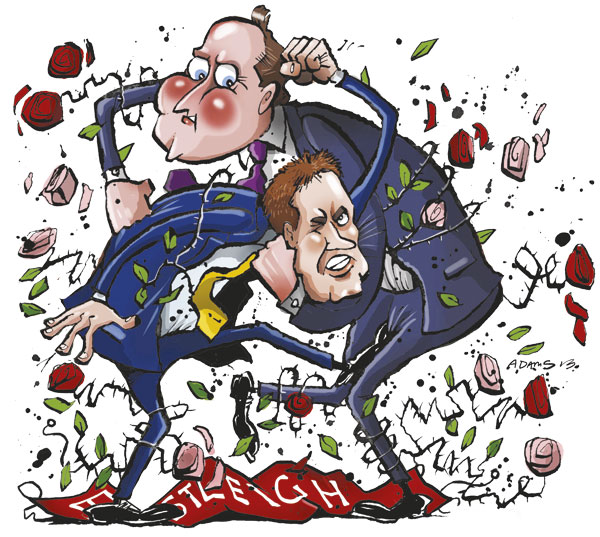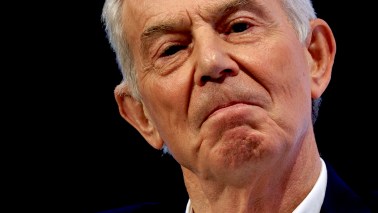Monday morning. Grant Shapps, the enthusiastic Tory party chairman, is sitting in a people-carrier, putting the final touches to a scathing press release attacking his Cabinet colleague, the Deputy Prime Minister.
Press release dispatched, Shapps gets out of the car and embraces his candidate, Maria Hutchings, and the pair set off to canvass. On this sunny morning, Shapps and Hutchings are followed by a large number of photo-graphers, a couple of journalists, a few press officers and a camera-wielding Tory MP. The only problem is there’s hardly anybody home, so it is the retired who are bearing the brunt of this manic campaign war.
Shapps and Hutchings go from house to house with no luck. Then, success! Somebody is in. The door opens, the flashbulbs pop and a startled resident emits a panicked shriek and covers her face. Next up is an elderly lady who opens the door in her dressing gown at midday only to find the nation’s media staring at her.
Later that afternoon I watch another irritated pensioner complain to the bemused Liberal Democrat candidate, Mike Thornton, that he has disturbed her nap. Luckily, the septuagenarian former Lib Dem leader Ming Campbell, a man who appears to appreciate the importance of an afternoon sleep, is on hand to smooth things over.
Eastleigh may look like a peaceful place, but behind the scenes a nasty skirmish is taking place. Those former rose-garden lovebirds, Cameron and Clegg, are locked in battle and there can only be one winner. There can be no coalition compromise here.
All the bigwigs are in town, from left and right, because Eastleigh is the most important by-election for 30 years. Not since the emergence of the SDP in the early 1980s as a serious political force has a by-election threatened to have such far-reaching political consequences. That’s why you’ll find the Prime Minister’s political secretary not in Downing Street, but behind a desk in a sparse office building opposite Eastleigh station.
It matters because it is a test — or will be seen by each party as a test — of both David Cameron and Nick Clegg’s strategies for the next election. No. 10 has consoled Tory MPs who resent coalition by saying it will enable them to win back the seats they’ve lost to the pesky yellows. Being in government, so the theory goes, will put an end to the tactical voting that lets Lib Dems take over traditionally Tory constituencies. And half of the constituencies the Tories are targeting at the next election to get a majority are held by the Lib Dems.
So Eastleigh is crucial. If the Tories can’t win here in these circumstances, it’ll be clear that they’re not going to take those seats off the Liberal Democrats in 2015. It’ll alert the party to the reality that if it is in government after the next election, it’ll be as part of another coalition. This will not improve the mood among restless Tory backbenchers.
For Clegg, it is a chance to show that the dire national polls mean nothing for 2015. Lib Dems claim that they are so firmly established in their redoubts that they’ll survive the national swing, and Eastleigh, where they have every councillor, is an extreme example. If they lose here, they could lose everywhere. Defeat would put Clegg’s leadership back on the critical list just ten days before his party’s spring conference. But victory would be the biggest boost to him since he entered the coalition.
The Prime Minister’s and Deputy Prime Minister’s proxies in Eastleigh are polar opposites. The Tory candidate Maria Hutchings is disarmingly open and keen to talk about her four children, two of whom are disabled. She was a member of the Labour party, albeit briefly, in her twenties, and even after a long conversation I’d struggle to place her on the Tory ideological spectrum. Her calling card is a combination of local issues — against the gravel pit and building on green fields — and national ones, warning that the Liberal Democrats are stopping the Tories from doing what they need to on immigration, welfare and Europe.
The Liberal Democrat candidate Mike Thornton has been picked for his blandness. ‘Isn’t our candidate wonderfully dull?’ says one Clegg aide. On the doorstep, his pitch is that the Liberal Democrats are cutting income tax and, second, that he’s local. The immigration issue has been got up by the national press, he says, and Ukip is trying to use it to scare people.
The Liberal Democrats’ local advantage looks like it will be decisive, though. While the Tories are knocking on doors trying to find supporters, the Lib Dems know precisely where their electors are. As Thornton and Ming Campbell march down the street, a clipboard-wielding activist bounces along beside them shouting out which house to go to and the name of who lives there. They have a laser-like focus on their own support base: it is a get-out-the-vote strategy. The ringmaster is thoroughly irritated by Sir Ming’s habit of setting off down every garden path.
Most Tories involved in the Eastleigh campaign are reluctantly coming to the conclusion that the Liberal Democrat ground operation will carry the day and they are already preparing excuses: ‘We’re trying to overturn 20 years of grass-roots campaigning in two weeks.’ One senior figure in the campaign estimates that they have, at best, a 33 per cent chance of winning. On a big post-it note in Lib Dem HQ, volunteers write why they have come down to help out. One message stands out, ‘Because Eastleigh is ours’.
As the two coalition parties scrap it out, Labour have failed to take off. Their candidate, the comedian John O’Farrell, is being monstered locally for saying he had hoped that Margaret Thatcher had been killed in the Brighton bomb. But one party is surging, Ukip. Eastleigh town centre is a little piece of the de-industrialised north in Hampshire, and the Ukip message is resonating with the abandoned working-class voters there. In the more prosperous parts of the constituency, they are picking up some old Lib Dem protest votes and playing on concerns about Cameron’s soundness.
Both coalition parties privately expect Ukip to come third. It has become the new ‘up yours’ party. I saw kids on half term taunt the establishment with shouts of ‘Voting Ukip!’ To the party’s delight, a couple of Thornton’s neighbours have requested the largest posters that can be provided.
Ukip’s shop in the town centre, plastered with anti-EU newspaper articles alongside posters bearing words such as ‘disgraceful’, is doing a roaring trade. Its candidate, Diane James, brings everything back to Europe with some panache. She insists that the new housing development, controversial in the constituency, is needed because of immigration, which is a result of free movement within the EU. The party’s campaign organisers claim that this is the best reception they have had in a by-election.
The Eastleigh by-election will be a moment of political significance. But it is being fought largely over local issues, not national ones. Our politics has responded to five years of crisis by becoming ever smaller.
Barring some last-minute development, the Liberal Democrats will win here. Their hyper-local campaigning will trump their national unpopularity. It promises to be a cruel spring for David Cameron.







Comments